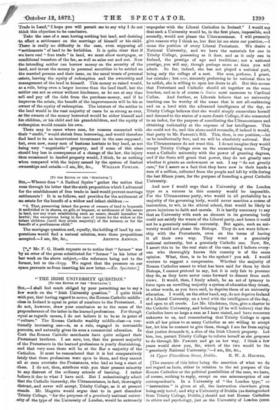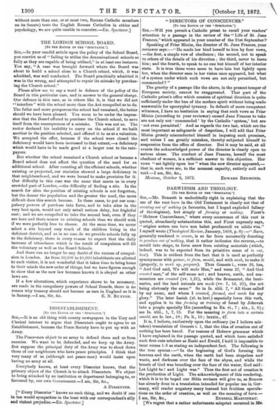"THE IRISH UNIVERSITY QUESTION."
(To THE EDITOR OF THE "spseraroa.1 Sta,—I shall feel much obliged by your permitting me to say a few words on the "Irish University question." I quite think with you, that having regard to means, the Roman Catholic middle. olass in Ireland is equal in point of numbers to the Protestant. I do not, however, draw your ,conclusion as to the cause of the preponderance of the latter in the learned professions. For though equal as regards means, I do not believe it to be so in point of "culture." The Roman Catholic wealthy middle-class—a con- tinually increasing one---is, as a rule, engaged in mercantile pursuits, and naturally gives its sons a commercial education. In Cork the Roman Catholic merchants have quite eclipsed their Protestant brethren. I am sure, too, that the present majority of the Protestants in the learned professions is yearly diminishing, and that very soon there will be at the Bar a majority of the Catholics. It must be remembered that it is but comparatively lately that these professions were open to them, and they cannot all at once overtake the Protestants, who had so long a start of .them. I do not, then, attribute with you their present minority to any distrust of the ordinary schools of learning. I rather believe it due to what I have said. But I unhesitatingly admit that the Catholic hierarchy, the Ultramontanes, in fact, thoroughly distrust, and never will accept, Trinity College, as it at present stands. Mr. Maguire would .argue that to in part disendow Trinity College, " for the purposes of a genuinely national univer- sity of the type of the University of London, would be extremely unpopular with the Liberal Catholics in Ireland." I would say that such a University would be, in the first place, impossible, and secondly, would not please the Ultramontanes. I will presently give reasons why I think so, but first let me state our position,—I mean the position of every Liberal Protestant. We desire a National University, and we have the materials for one in Trinity College, possessing as it does, and as it only can in Ireland, the prestige of age and traditions ; not a national prestige, you will say, though perhaps more so than you will admit. So far, indeed, she has not played a national part, being only the college of a sect. She sees, perforce, I grant, her mistake ; but now, sincerely preferring to be national than to be selfish, she is willing to open her doors to all. But this means that Protestant and Catholic should sit together on the same benches, and so is of course in limine most nauseous to Cardinal Cullen. And further, as Liberals believe that no university teaching can be worthy of the name that is not all-embracing and on a level with the advanced intelligence of the day, so Trinity College believes that she would simply emasculate herself and descend to the status of a mere Jesuit College, if she consented to an index, for the purpose of conciliating the Ultramontanes and obtaining nationality at the expense of her intelligence. This she could not do, and this alone could reconcile, if indeed it would, that party to Mr. Fawcett's Bill. This, then, is our position,—let us be intellectually free, and we will be absolutely national. But the Ultramontanes do not want this. I do not imagine they would accept Trinity College even on the emasculating terms. They want a Catholic university with the power of granting degrees, and if the State will grant that power, they do not greatly care whether it grants an endowment or not. I say "do not greatly care," for I assert as a fact that they have now in their hands a Bum of a million, collected from the people and left by wills during the last fifteen years, for the purpose of founding a great Catholic University.
And now I would urge that a University of the London type as a success in this country would be impossible. For the Ultramontane party, who would in all probability be a majority of the governing body, would never sanction a course of instruction, to wit, in the ethical school, that would be likely to prove injurious to faith and morals. It is hardly necessary to say that an University with such an element in its governing body could not satisfy the wants of the Liberal party, and hence it could not be a genuinely national university. But again, such an uni. versity would not please the Bishops. They do not want fellow- ship with the Protestants, even on the terms of having it all their own way. They want not a genuinely national university, but a genuinely Catholic one. Now, Sir, I meat this to be the real state of the case, and I believe every- one who thoroughly knows this country is of the same opinion. What, then, is to be the upshot ? you ask. I would venture to suggest a compromise. Whether the majority of Roman Catholics assent to what has been said for them by their Bishops, I cannot pretend ,to say, but it is only fair to presume they do, as they have never come forward to dissent from such views. It would, then, I freely admit, be an act of tyranny to force upon an unwilling majority a system of education they detest, in other words, as you have said, to deprive them of an university education. I would, on the other hand, say, do not deprive Ireland of a Liberal University, on a level with the intelligence of the day, and open to all creeds. Let Mr. Gladstone, then, give a charter to the Catholic University, and believing (if he will believe) that the Catholics have so large a sum as I have stated, and have resources unknown to us, and remembering that Trinity College is open with all her prizes to as many Catholics as are willing to accept her, let him be content to give them, though I am far from saying that justice demands it, a slice of the Irish Church property. Let him, too, permit Trinity College to reform herself as she proposes to do through Mr. Fawcett and go on her way. I think a few years would show you, Sir, which of the two would be the "genuinely National University."—I am, Sir, &c.,
24 Upper Fitzwilliam Street, Dublin. R. W. A. HoLmrs.
[The essence of this letter being the assertion of what we do not regard as facts, either in relation to the set purpose of the Roman Catholics or the political possibilities of the case, we have, of course, nothing to reply, except on one misconception of our correspondent's. In a University of "the London type," no " instruction " is given at all, the instruction elsewhere given being only tested; and why a University of Dublin (as distinguished from Trinity College, Dublin,) should not test Roman Catholics in ethics and psychology, just as the University of London (even without more than one, or at most two, Roman Catholic members on its Senate) tests the English Roman Catholics in ethics and psychology, we are quite unable to conceive.—En. Spectator.]



































 Previous page
Previous page